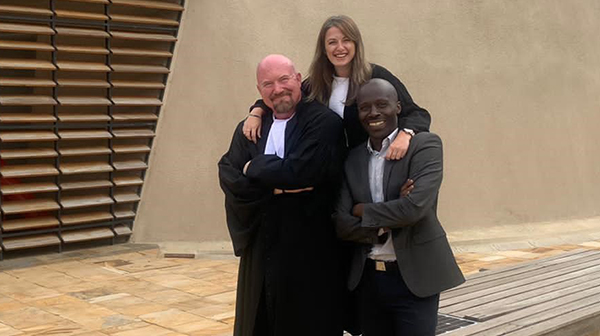A Home in the Hague
Wichita lawyer fulfills goal first established during studies overseas

(Kurt Kerns, ’91, with his legal assistant and client after a trial they won at the Mechanism for International Criminal tribunals in Arusha Tanzania. The client was acquitted but four other co-defendants accused were convicted at the trial that ended in June. Photo submitted)
From Washburn Lawyer - 2021-22
By Chris Marshall
In 1670, a 26-year-old was arrested in London for preaching nonconformist religious views at a time when the English monarchy was attempting to suppress dissent. During the man’s trial, the defense argued that speaking on a street corner was not a violation of the law, and the Crown produced no substantive evidence against him.
When the man was found not guilty, jury foreman Edward Bushnell was imprisoned for weeks. For the duration of his time behind bars, Bushnell held to his stance that trials should be decided by jurors, not the king’s desires. With his freedom granted by Bushnell and the jury, the man left his home country to start a new life in the United States.
When Kurt Kerns, ’91, first heard this story studying at a Washburn University summer program in England, it became clear what field of law he wanted to pursue.
“He was nothing more than an innocent man who was accused of fighting against power,” Kerns said, “and the jury wouldn’t convict him. When I read that, it inspired me to get into international law.”
Now one of just 26 American lawyers authorized to appear before the International War Crime Tribunal at The Hague, Kerns eventually achieved his goal, but the journey to practice overseas was far from direct.
For 25 years and counting, Kerns has been a partner with Ariagno, Kerns, Mank & White, the firm he helped found in Wichita, Kansas. He maintains a successful record in murder trials and has been featured as a legal commentator on national networks like Court TV and A&E.
When a friend suggested a business trip to the Netherlands, Kerns couldn’t resist. Unfortunately, his first visit to The Hague, and several subsequent trips, each had the same result: Watch trials. Meet lawyers. Fly back to Wichita with no new opportunities. Repeat.
“By my seventh trip,” Kerns recalled, “people said, ‘What are you going to do, corner the market on Wichita war crimes?’ I said, ‘Wait and see.’”
On lucky trip number seven, a lawyer named Jelko Par asked Kerns to join him in defending Vinko Martinivic, a Croatian commander during the breakup of Yugoslavia.
Kerns recalled Par asking “Are you going to keep coming here until you get a case? I guess I better hire you.”
While working the case, Kerns made a connection with attorney Dragan Ivetic, who a few years later brought Kerns onto the defense team of Ratko Mladic, a general dubbed “the butcher of Bosnia” for having 7,000 boys and men killed.
Kerns’ wait to work inside The Hague was finally over, but he soon learned the need for patience remained. Eight years after Kerns first started on Mladic’s case, his appeal was denied. Mladic’s life sentence was upheld in June 2021 for crimes during Bosnia’s 1992-95 war.
“Martin Luther King Jr. said, ‘Justice delayed is justice denied.’ I don’t think they’ve ever heard that phrase in international courts,” Kerns said. “The process of justice overseas is incredibly long, as demonstrated by fact we’re still dealing with war crimes coming out of the former Yugoslavia in the ’90s and genocide in Rwanda in 1994-96.”
Since getting his first opportunity overseas, Kerns has established standing offices in the Netherlands and Tanzania, but it was his longtime ties to Wichita that put him in the right place at the right time in 2010. As his doubters once predicted in jest, the first genocide case to be tried on United States soil happened to be in Kansas, making Kerns the obvious choice to lead the defense of Lazare Kobagaya.
“All the people making fun of my interest in international war crimes had to eat their words,” he said. “The only one with experience in that area around here was me.”
Kobagaya was accused of lying on American citizenship forms, and as part of the charges, prosecutors claimed he ordered the deaths of hundreds of people during the 1994 genocide in Rwanda. Kerns argued Kobagaya was fleeing the country during the attacks.
Over the course of two years, Kerns flew all over Africa, attempting to track down witnesses in eight different countries. At one point, he was nearly jailed in Rwanda while trying to interview a witness.
“The government spent over $2 million processing the case,” Kerns said, “and we ended up winning it. So, Lazare lives comfortably in Topeka, Kansas, these days.”
The charges against Kobagaya were much more severe than those in the trial that first inspired Kerns as a Washburn student, but the end result was the same: a person freed of accusations in their homeland was able to start anew in the United States.
Whether a person faces imprisonment for war crimes or simply for speaking his religious views, a fair trial is a national right deserving of universal application. Kerns has held onto that belief since his trip abroad years ago, even if it took longer than he would have liked to put it into practice.
“Washburn motivated me to go fight for the people,” Kerns said, “and be a voice for people around the world who don’t have a voice.”